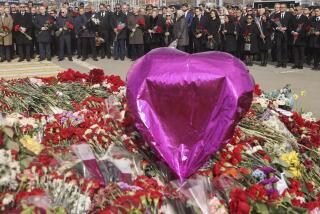Russian Police Back Plan for Joint Anti-Mob Effort : Law enforcement: FBI chief winds up trip through former Soviet Bloc. He cites nuclear piracy fears.
MOSCOW — Warning that organized crime in Russia poses “a significant and direct threat to the United States,” FBI Director Louis J. Freeh won support from Russian police Monday for a joint crackdown on mobsters, including anyone trying to pirate and sell nuclear bomb-making material.
“We are proud to join in this battle with you,” Freeh said in a pep talk to 500 elite officers at Russia’s Interior Ministry Academy. He urged them to act decisively, but within the law, to stop Russia’s mob from growing as powerful as the American Mafia of the 1920s and ‘30s.
The half-hour address was the keynote of a three-day visit to lay down what Freeh called “a police-to-police bridge” between the former Cold War enemies. He closed with verse from the late Russian poet Anna Akhmatova: “The hour for courage strikes upon our clocks, And courage will not desert us.”
Freeh is winding up a 10-day trip--the first by an FBI chief through the former Soviet Bloc--that netted agreements allowing his agents to gather records, interview witnesses and seek criminal evidence in Germany, the Czech Republic, Slovakia, Hungary, Poland, Lithuania, Latvia, Estonia and Ukraine.
A similar accord, to be signed here today, will clear the way for systematic exchanges between the FBI and Russian police to prevent and solve such crimes as drug trafficking, kidnaping, extortion, fraud, money laundering and terrorism in both countries.
To oversee these exchanges, the FBI is setting up a permanent office in Moscow and staffing it with two Russian-speaking agents supervised by the U.S. ambassador.
“We have now already joined (forces),” Sergei V. Stepashin, chief of the Federal Counterintelligence Service, said after meeting Freeh at his office inside one of the most dreaded Soviet landmarks--the former KGB headquarters and execution chamber on Moscow’s Lubyanka Square.
“When we are together, we’re undefeatable,” the Russian spymaster added.
Yet it remains to be seen how much police cooperation there can be between two powerful nations that still spy on each other. It was only five months ago that the arrest of a high-level Russian “mole” inside the CIA shook up the post-Soviet friendship between Washington and Moscow.
Before Freeh’s arrival Saturday night, Stepashin dismissed as unwarranted the nightmare scenario that prompted the visit in the first place--that Russian nuclear weapons and materials are vulnerable to terrorists and criminal groups throughout the old Soviet Bloc.
“All attempts to accuse Russia of being unable to control its nuclear weapons have clear political goals,” Alexander Mikhailov, a spokesman for Stepashin’s spy agency, said last week. “They are aimed at preparing Western public opinion for the idea of establishing political control over Russian nuclear weapons.”
U.S. and German officials have reported three suspected diversions of weapons-grade uranium and plutonium material from Russia since 1993. While the quantity of material in each case was thought to be insufficient to produce a bomb, Freeh said Monday that the risk of “loose nukes” is growing.
“We cannot afford to wait until there is a successful diversion of a significant amount of nuclear material before we develop and implement . . . a plan of action to address this grave threat,” he told the academy officers.
Lt. Andrei V. Tikhanov, a 29-year-old student in the packed auditorium, agreed. “Worse come to worst, the consequences wouldn’t spare anyone,” he said. “Mr. Freeh calls for cooperation just in time for us to be able to avert this menace.”
Judging from daily news reports, the officers in the audience, who earn an average of $150 per month, are fighting a losing battle against rich and powerful criminal gangs that have mushroomed since the Soviet police state collapsed in 1991 and now number an estimated 5,600.
While the United States is “an increasingly desirable target of opportunity” for such gangs, Freeh said, they pose an even greater danger to their own country’s democratic hopes. He said Russian President Boris N. Yeltsin was right to call the mob Russia’s top security threat.
Eager to show their guest that Yeltsin’s latest crackdown on crime is working, the police said Monday that they had arrested a gang for allegedly holding an 8-month-old girl hostage for 32 days and collecting a $270,000 ransom from her businessman father by threatening to cut off her head.
A separate announcement said police had seized members of a neo-Nazi skinhead group called Legion of Werewolf, accused of plotting to burn down every Moscow theater showing the Oscar-winning film “Schindler’s List.”
More to Read
Sign up for Essential California
The most important California stories and recommendations in your inbox every morning.
You may occasionally receive promotional content from the Los Angeles Times.










